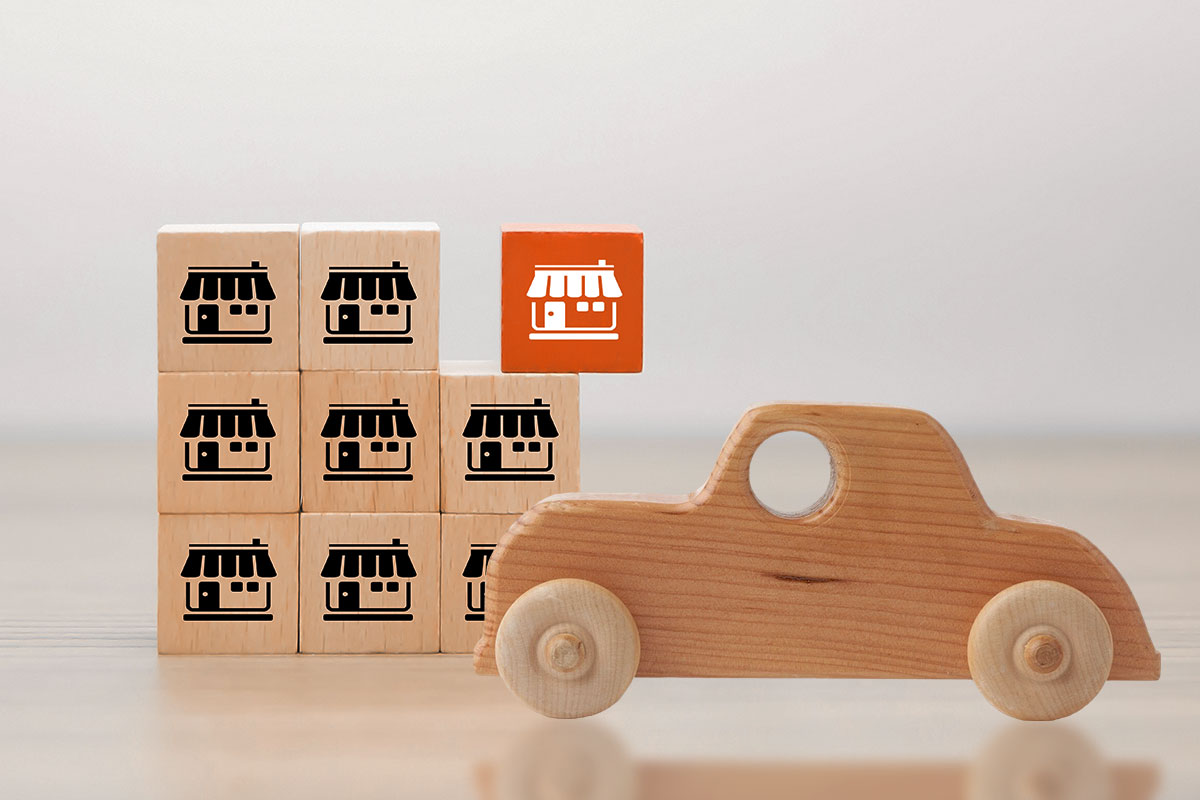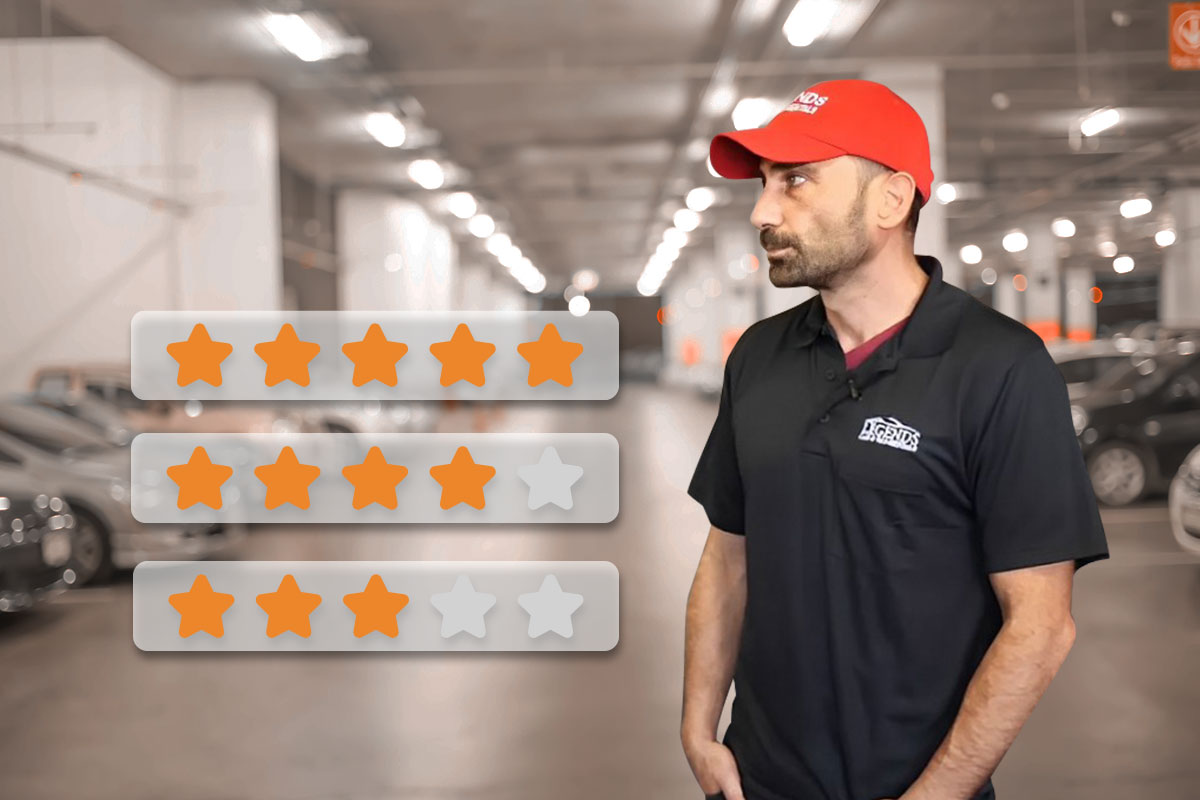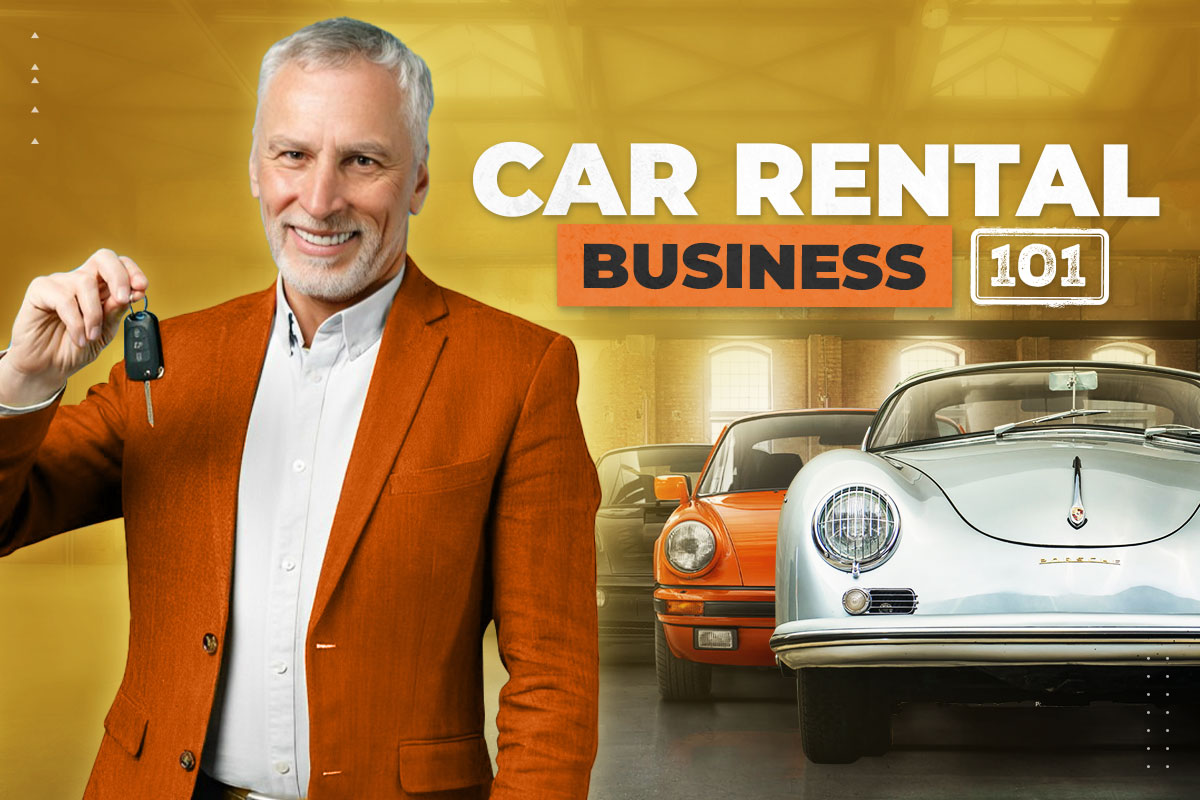Do you love cars? Are you already putting a lot of time and money into your automobiles? Then it may be time to make money with your passion for vehicles.
The U.S. car rental industry is worth $57.5 billion annually. You can get your share without spending millions in startup costs. We talked to Ronnie Danelian, owner of Legends Car & Van Rentals in Los Angeles. He explained how to start a car rental business with only $10K and grow it into $2.1M of annual revenue.
So sit back and buckle up! This is our step-by-step guide on how to start a car rental business from scratch. You can either keep reading straight through or click on any of the links below to jump to that section:
Learn About the Car Rental Industry
Before you start a rental car business, you should learn more about the industry and what makes a successful car rental business. Here’s a brief overview to help you get started.
How much does it cost to start a car rental business?

According to our business ideas database, you should expect to spend an average of $55K to start a car rental business. This includes the following expenses:
- Business registration and licenses
- Attorney fees
- Accountant fees
- Deposit or rent for a business location
- Marketing and advertising
- Website hosting
- Office supplies
- Inventory or fleet
- Insurance
- Maintenance
- Employees
Ronnie started his car business with a $10,000 investment, but Ronnie’s business is highly specialized. A rental car service can often be a far more expensive business venture.
Kelly Blue Book notes that the average purchase price for a new car is $48,644. Buying even one or two vehicles could cost you $50K or more. That means a larger enterprise could cost as much as $2 million.
We asked Ronnie about his biggest ongoing expense:
Other large costs will include insurance, advertising, and maintenance costs for your fleet of vehicles.
How much does a car rental business make?
According to the UpFlip Academy, the average car rental business makes $17 million per year. However, you should expect that number to decline given that sites like Turo allow people to start a car rental business more easily than ever before.
Despite the disruptive strategy of the Turo app, the industry is currently making $57.5B per year and is expected to grow at a rate of 1.8%. But any time the number of businesses grows faster than the industry revenue, the average revenue will decline.
Is it profitable to start a rental car business?
Yes. The average car rental business has a profit margin of approximately 6.7%, which converts to roughly $1.14 million in annual profit.
Get Experience with Cars

There are numerous ways to get experience by working with cars. You could join a car rental company as a car rental clerk or learn basic auto repair. Many community colleges offer auto repair classes.
Case Study: Legends Car & Van Rentals
We interviewed Ronnie Danelian, owner of Legends Car & Van Rentals in Los Angeles. Ronnie was an internet marketer with no experience offering car rental services, but he knew how to get leads for them:
Ronnie started renting his luxury cars with only $10,000. He’s rented his exotic and classic cars to the LA upper class, movies, and music videos.
Today, he rakes in over $175K a month!
Learn how to start a luxury car rental business in the first part of our interview with Ronnie:
How to Start a Car Rental Business
Starting a car rental business can be an extremely profitable and rewarding career, but it helps to have a defined process. We suggest the one below:
- Choose a type of car rental service.
- Identify your target market.
- Write a business plan.
- Set up your vehicle rental business.
- Prepare your finances
- Choose a location.
- Create a car rental contract.
- Build a team.
- Secure your car fleet.
- Create and implement a marketing plan.
- Provide great customer service.
Get ready to learn how each step gets you closer to starting a rental car business of your own.
Step #1. Choose a Type of Car Rental Business
There are five main ways of starting a car rental business:
- Starting an independent rental company
- Providing rental cars to dealerships
- Buying an existing rental business
- Opening a franchise
- Renting cars on Turo
We’ll explore these different types in the next sections to help you decide.
Independent Rental Company
You might want to start an independent car rental service like Ronnie.
There are numerous national car rental businesses such as Enterprise Rent-A-Car, Hertz, and Budget Car Rental that dominate the market for business travelers. You’ll probably have smaller fleets, so offering unique car rentals will help you stand out in this competitive sector.
Watch part two of our interview to learn more about Ronnie’s business:
Car Dealership Rental Office
Opening a car rental company as part of a car dealership is another option to explore. In this style of business, your company rents to customers who bring their cars in for bodywork or other repairs.
You don’t need a large inventory, which helps with start-up costs. On the other hand, this type of car business limits the number of customers you have and ties your success to the success of the dealership.
Buy an Existing Rental Business
There are two options when you don’t want to start a business from scratch: purchase an existing business or buy a franchise. The key advantage of buying an existing business is that the structure of the business is already in place with an existing customer base.
You’ll need to conduct extensive research before purchasing. It’s important to understand the value of the business and its market. Ask questions such as:
- Does this business fill a market need?
- Will the customers continue to be loyal under new ownership?
- Would the ownership transfer run smoothly?
Learn more about buying a business.
Open a Franchise

Investing in a car rental franchise means that you’re working with an established brand and business model. Some of the top car rental franchises include the following:
- Hertz: $55K franchise fee and a total initial investment from $300K to over $1M
- Dollar: Requires a net worth of $500K or more and at least $150K in liquid capital
- Thrifty: Requires a net worth of $500K or higher and at least $150K in liquid capital
- Budget: $20K franchise fee with a total initial investment between $150K and $450K
If you love vehicles, but a car rental business doesn’t sound right for you, check out these other vehicle-based businesses:
Turo Car Rentals
Turo is a middleman like Uber or Airbnb. It provides a platform for people who want daily car rentals and car owners who want to rent their car while they aren’t using it. Learn how to start renting your car on Turo.
Step #2. Identify Your Target Market

Before starting a car rental business, you need to determine your target market. In most instances, your target market is contingent on your location. This will help you analyze several market factors such as:
- Income level
- Age
- Occupation
It’s important to align your fleet with the needs of your market. For example, if your rental business is near an airport and has high traffic for executives, your fleet should suit those tastes.
Legends Car & Van Rentals specializes in renting classic and exotic cars to luxury-focused clientele. They also rent vehicles to producers for movies and music videos.
Other specialized markets include:
- Outdoor and recreational vehicles
- Business vehicles
- Long-term rentals
- Delivery vehicles
- Short-term or vacation rentals
- Motorcycles
It’s up to you to study your local market and figure out which vehicles will work in your area. Fortunately, the U.S. Small Business Administration offers resources to help you conduct research.
Step #3. Write a Business Plan
Having a business plan increases your chances of success by keeping you focused. It also tells employees and potential investors what your business is trying to accomplish. This plan will help create your vision, strategy, and outlook.
A business plan isn’t just an outline. It’s a detailed document used in every aspect of your operation, including loan applications and investor pitches. Your business plan should include the following:
- Executive summary
- Objectives and a mission statement
- Description of your company
- Inventory
- Competitor analysis
- Marketing and advertising plan
- Management summary
If you’re still not sure how to write a business plan, download our free business plan template.
Step #4. Set Up Your Vehicle Rental Business

In order to set your business up for success in the rental car industry, you’ll need to address the legal aspects of your business. Here’s what you’ll need to establish your business:
- Business name: The key is to choose a business name that’s easy to remember and available as both a website and a trademark. Check out our business name generator for more ideas.
- Web domain: Check to see if the domain is available. Our business name generator does this for you and gives you the option to purchase a domain from NameCheap.
- Limited liability company or corporation:Typically, a car rental business will be set up as a limited liability company (LLC) to avoid exposing the owner’s personal assets to legal action.
- Employer identification number: You’ll need an EIN to pay your business taxes or hire employees. You can apply for an EIN directly with the Internal Revenue Service.
- Business licenses and permits: Each state, county, and city may have special licenses and permits you need. These requirements vary by location.
- Business bank account: A business bank account is crucial for keeping your business funds separate from your personal assets.
The U.S. Small Business Administration and the IRS website have extensive resources on business structures.
Step #5. Prepare Your Finances.
Money is one of the biggest hurdles for starting any business. But before you open your doors, you must organize your finances and secure funding.
Funds to launch your business can come from:
- Personal savings
- Loans from family or friends
- Investors
- Loans
The exact distribution is up to you. For instance, Ronnie split his start-up costs at $5K per investor.
If you want to learn more about raising capital for your business, we created a two-part video series on seed funding for startups:
Step #6. Choose a Location
Like many businesses, a car rental startup can succeed or fail based on location alone. The location you select should be easy for your target market to access while staying within your overall budget. Make sure the location has enough space to manage car rentals and grow as your business expands.
Check out our blog to help you choose the best location for your business.
Step #7. Create a Car Rental Contract
A car rental agreement is the cornerstone of a successful rental program. It spells out the terms of the rental including billing, insurance, and how accidents will be handled while rental vehicles are in a customer’s possession.
It’s up to you to ensure that the customer’s insurance is valid and that they can cover the costs in the event of an accident. As Ronnie explained, the biggest mistake of any car rental business is to rent to someone you shouldn’t have:
Check out the rental terms from Budget to get an idea of what should be in your car rental contract.
Step #8. Build a Team

When thinking about how to start a rental car business, it may be tempting to believe that your rental program can be a one-person operation. Don’t fall into this trap.
At a minimum, a rental program should have the following team members as employees or contractors:
- Customer service representative
- Mechanic
- Business lawyer
- Accountant
- Marketing professional
While you may be able to play the role of two or three of these positions, you’re more likely to have success if there is a different person handling each of these key roles.
Step #9. Secure Your Car Fleet
Obviously, you’ll need to buy cars before you can start a car rental business. It’s the most important aspect of your business model. Let’s look at some of the things you’ll want to consider as you start a car rental business.
What is the difference between leasing and buying a car?
Leasing a car means you’re just paying to use it for a certain period of time. Buying a vehicle means that it’s yours to sell once it’s paid off.
Leases often come at a lower cost than buying, which is why people who frequently replace their cars tend to lease them. Buying puts both an asset and a liability on your company’s balance sheet and lets you sell the car when you’re done with it.
Before leasing a vehicle you intend to rent out, review the terms of your lease agreement to make sure the owner allows this practice. Also, be aware that the dealer requires you to pay the lease regardless of whether you can find someone to rent the vehicle.
Where can I buy cars?

Some of the popular ways you can buy cars include:
- Local dealerships: Make sure you know what you want and the retail value. Save up at least 20% as a down payment, and don’t accept add-ons.
- Consumers: Sites like Craigslist, Cars.com, and eBay Motors are great places to find used and classic cars.
- Auctions: If you have a used car dealer license, you can go to dealer auctions. You can also go to repo auctions and sites like Insurance Auto Auctions, Auto Auction Mall, or Purple Wave.
Are there other ways to build a fleet?
Turo uses a unique way of acquiring a fleet. They provide fleet management software and vehicle insurance for independent car owners to rent their cars to other people.
Ronnie used a similar strategy when starting his business:
Instead of renting or leasing vehicles, Ronnie sourced partner cars from people who let him lease their cars out on commission. If you’re having trouble purchasing or leasing vehicles for your fleet, remember Ronnie’s advice:
What is the best car to buy?

Ronnie explained the hit-or-miss experiences at Legends that apply to the entire industry. Ask yourself these questions before purchasing a car:
- Does this vehicle accommodate my target market?
- Can I get a good return when I sell the vehicle?
- Does this model have maintenance issues?
- What does my market research say about this vehicle in my area?
A great way to test a car’s viability is by making a “coming soon” post on your business website or social media accounts. See what reservations you get and how people react to it as a test.
Pro Tip: If you invest in a franchise, some offer fleet supplier programs and some don’t. The franchisor will have data on the best cars to rent in your area.
When should I refleet a rental car?
People tend to put a lot of miles on rental cars in a short period. Most of the major rental car companies sell their rentals when the mileage is under 100K, with a sweet spot in the 20K to 80K range. Ronnie explained why:
What is the best car rental business insurance?
Zurich NA was the top result when I searched “best insurance for car rental business.” Any insurance provider should offer rental car business insurance, but you’ll want to compare the prices.
Car insurance is required to drive any vehicle legally. Get a commercial policy to cover your fleet in case of an accident.
As Ronnie explained, rental car business insurance is one of the largest expenses:
When we asked Ronnie how many cars in his fleet have been involved in an accident, he said:
Customers often pay more for the cost of insurance coverage, but remember what Ronnie said about the car rental business:
We recommend using Simply Business to compare quotes from the countries top business insurance companies.
Step #10. Create and Implement a Marketing Strategy

Marketing in the car rental industry is a multi-billion-dollar business. Ever notice how many car rental commercials you see during the Super Bowl?
Unless you’re partnered with a franchise, your small business will need to find creative ways to reach the market.
Create a Website
Don’t worry if you don’t have experience creating a website or engaging in digital marketing. It’s easy to find a knowledgeable web designer and webmaster to create and manage your website.
However, if you want to create your own site, you can use a web development company like Wix to design your site and logos.
Start a Digital Marketing Campaign
Ronnie stated that the best bang for his buck has come through Google advertising. He started with a budget of $300 and now spends over $8,000 per month. However, Google Ads can be expensive and less effective without experience.
Check out our Google Ads for Beginners program in UpFlip Academy to learn how to create Google campaigns. Alternatively, you can always hire a freelancer through Upwork who specializes in Google Ads campaigns.
Pro Tip: Word-of-mouth advertising is your greatest ally. There’s no better way to get referrals than by providing outstanding customer service!
Offer Free Rental Days
Car rental companies often have loyalty programs that help retain customers and increase customer lifetime value. You can compare some of the programs below:
- Enterprise Plus: Customers earn one point per dollar. It requires a minimum number of rentals to qualify.
- Hertz Gold Plus Rewards: This program is similar to Enterprise Plus but with higher point multiples.
- Turo Bonus Days: Customers earn a free day with this car sharing app after renting a car for 10 days. I’d personally use this business model because it shows appreciation for repeat customers.
Step #11. Provide Great Customer Service

Customer service in the car rental industry is unique and tied directly to the profits of the business. Here are the best tips to increase your profits and stand out in the industry:
- Upsell when you can, but don’t force the customer into add-ons they don’t want or need. Most of the time, they just want to rent a car.
- Consistently ask for reviews and feedback after customers are finished with their rental.
- Monitor your online reviews and respond to every one, whether positive or negative.
- Train yourself and employees to speak to customers like people instead of robots.
Sticking to these best practices has worked well for Ronnie:
You’ll also want to have customer relationship management software like Hubspot to help you keep track of all your customers and their rental history.
Car Rental Businesses FAQ
Let’s review some frequently asked questions that people often have while starting a business in the car rental industry.
How to start a car rental business with no money
The business plan you created comes in handy at this stage of your enterprise. A business plan is required to apply for SBA loans and funding programs. Other funding options include crowdfunding, home equity loans, or a rollover for business funding from your retirement plan (ROBS).
You can also apply for a credit card with an interest-free period to help kick things off if you have good credit. There are also business loans, such as equipment financing or a business auto loan, you can use to fund specific aspects of your business. These loans are often easier to get since you’ll have physical equipment to act as collateral.
Make sure you do your research and understand the risks associated with different types of loans before you apply.
How to start an exotic car rental business
Starting an exotic rental car company usually means that you’re targeting high-end clientele. This business model works very similarly to starting any rental business, but you’ll want to make some key adjustments:
- Higher start-up costs: Luxury cars are more expensive, so they’ll cost more to purchase.
- Better insurance: You’ll want the best possible insurance to cover the full value of each rental car.
- More customer perks: High-end car companies might offer rentals by the hour or provide other amenities like photo release agreements.
What is the best car rental business software?
There are numerous software providers that focus on helping a rental car business succeed. Some of the best include:
- Xtime: This platform is built for mechanic shops, but it offers many related features like booking appointments that are useful to get your rental car business up and running.
- Rently: This software company offers software for both real estate and the car rental industry. Learn more about Rently.
Conclusion
With this guide, you have all the knowledge you’ll need on how to start a car rental business. With that, we’ll leave you with one final bit of advice from Ronnie for entrepreneurs looking to get into the industry:







